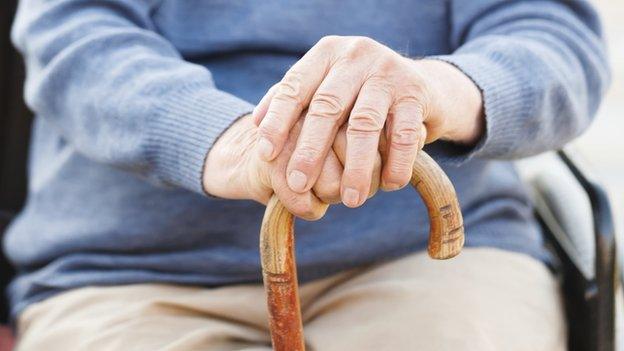Dumfries and Galloway study finds home death decline
- Published

The study found the cause of death had a significant influence on the place of death
Researchers in south west Scotland have found the proportion of people dying at home has fallen over a 10-year period.
The percentage dropped from 30% to 23% between 2000 and 2010.
The study, which could be replicated for the rest of Scotland, examined the place of death of almost 20,000 residents of Dumfries and Galloway.
As well as finding a fall in the number of home deaths it also found that the cause of death had a significant influence on where a person died.
The study team was led by Dr Chris Isles, consultant in renal medicine at NHS Dumfries and Galloway and David Clark, Professor of Medical Sociology, based at the University of Glasgow's Dumfries campus.
"We show that in the decade to 2010, most deaths occurred in places other than home and also there was a steady fall in the proportion of home deaths - from 30% to 23%," said Dr Isles.
"The other major finding is that we can show that what a person dies from determines where they die: people with heart disease and cancer are most likely to die at home; people with stroke and dementia are very unlikely to do so."
'Stated preference'
Between 2007 and 2010, men were more likely to die at home than women, while both sexes were less likely to die at home as they became older.
Older people with dementia as the cause of death were particularly unlikely to die in an acute hospital and very likely to die in a residential home.
Between 2007 and 2010, an increasing proportion of acute hospital deaths occurred in the specialist palliative care unit at Dumfries and Galloway Royal Infirmary.
Dr Isles said: "Lots of evidence tells us that home is the place that most people say they would like to die.
"However the proportion of people dying at home fell during our survey which means there is a mismatch between stated preference for place of death and where death actually occurs."
'Quality marker'
Prof Clark said the findings had significance beyond the Dumfries and Galloway area.
"Death at home is often used as a marker of the quality of end-of-life care," he said.
"Current policy emphasises that people should have a choice in the type of care they receive at the end of their lives.
"In some other countries - England and Canada - it looks as if the decline in home deaths has 'bottomed out' recently.
"It's vital that we take the time now to find out more about patterns of death in Scotland to ensure we all get the end of life we would wish for our families, loved ones and for ourselves," he said.
Dr Isles said they now wanted to look at trends since the survey period ended to see if the fall in home deaths had stopped.
"The study also needs to be replicated for the whole of Scotland and we are trying to make that happen," he said.
- Published9 March 2015

- Published19 March 2014
